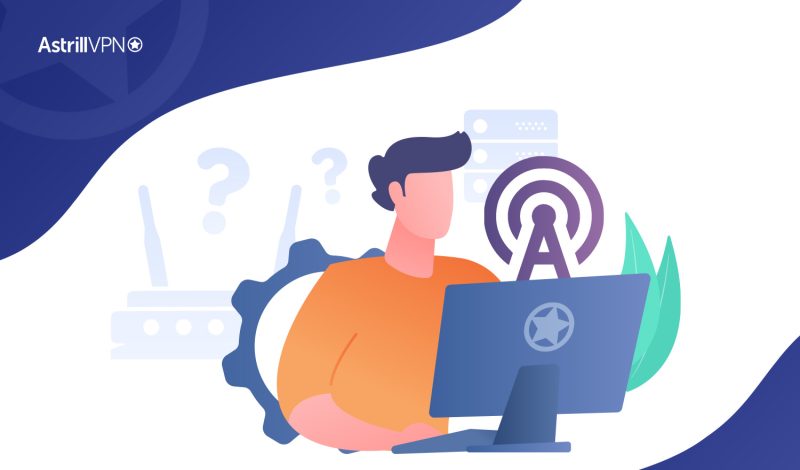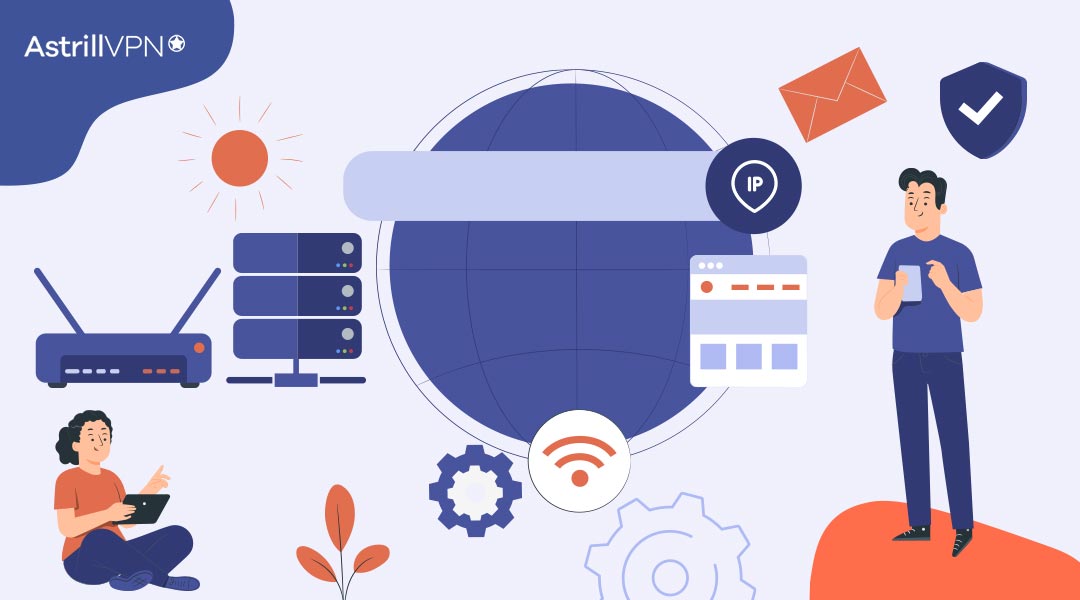Who is my Internet Service Provider? Know Your ISP and Level of Access

Arsalan Rathore

Most countries have a variety of internet service providers to choose from, each with its own set of pricing packages, download limits, access methods, and routing technology.
Table of Contents
How to Check Your ISP?
If you are wondering, “Who is my internet service provider” then you can follow these steps:
- Open your browser
- Go to Astrill’s IP Lookup Tool
- Your ISP will be displayed below your IP Address and Country name.
Who Can See Your ISP?
If you are not using a VPN, anyone worldwide can easily see your ISP. Since each IP address is associated with a single Internet service provider (ISP), it is possible to check the internet provider by address.
Types of ISPs
There are five types of ISPs around the world that have been around for a long time:
Dial-up Service
The user must have a modem for Internet access using a dial-up ISP. By dialing a phone number, the user can access a distant server, establish a connection, and use the phone connection to browse the internet.
Demand for dial-up has decreased over time as high-speed Internet has replaced it. Dial-up Internet, although extremely slow, is nevertheless required in many rural and remote regions.
Digital Subscriber Line (DSL)
DSL internet service is provided by phone lines and is fast enough for casual web surfing, video streaming, and playing minor games. DSL uses the “additional” signals that are not needed by traditional telephone signals. Because of these “additional” signals, DSL can be used even when the phone is ringing or other users are accessing the network over the phone line. A DSL router connects to a phone jack through a telephone connection.
High-Speed Cable Internet
A user can get cable internet service through the area’s cable provider. To get online through cable, plug your computer into a special connector and connect your cable router. Cable Internet service providers (ISPs) typically offer higher speeds, especially in low-traffic areas.
In contrast to DSL, cable connections are shared across neighbors, meaning that access speeds for cable customers are affected by the traffic volume on the network.
Fiber Optic Internet
Fiber optic cables, made of extremely fine glass fibers, are used by fiber internet systems to transmit data. It is still the quickest way to guarantee internet connectivity almost anywhere in the world.
Satellite Internet Service
Those unable to subscribe to a higher-speed service like DSL or Cable can use satellite access instead. Even though the download speeds of a satellite connection are lightning-fast, the upload rates are incredibly slow because of the necessity of a modem. People living in remote places with limited access to alternative broadband options often utilize this Internet service provider.
Difference Between Your ISP and Your IP Address?

ISP:
If you have internet access through a company, they are called an ISP. They are the ones who set up your router’s internet connection and give you an IP address.
IP:
A router’s IP address is its identifier on the internet. Your IP address is a unique set of numbers and letters that identifies your network. It can be viewed by anybody on the Internet, including the websites you visit, the apps you use, the peers you share torrents with, and your Internet service provider.
Now the question in your mind would be, “who is my internet provider or ISP”?
What Can Your ISP see?
Since your ISP controls your connection, it has complete access to all your online activity. Your IP address, location data, and DNS requests made by your devices while online are all accessible. Your internet service provider can also monitor and inspect any data sent or received between your network and the rest of the internet that is not encrypted.
To know more about what your ISPs can see, check out Astrill’s in-depth guide on ISPSurveillance. It will help you understand more about the level of control and access the ISPs have on you.
Importance of Knowing Your ISP and the Level of Surveillance
As the company that handles your web traffic, your ISP can see almost everything you do online. In most countries, ISPs are legally allowed to collect this data; some can even sell it to advertisers and third parties. This is why it is important for users to know their ISPs and what they are doing with the user’s data.
Even though there are data privacy laws in 69% of countries around the globe, yet, ISPs can sell your data forward because of their access to it and the twisted policies that allow it to do so.
Surveillance programs operated by the 5,9,14 Eyes Alliance allow ISPs to monitor users’ online activities and record their data. Some of these programs are:
- PRISM
- XKeyscore
- Tempora
- MUSCULAR
- STATEROOM
You can check out our detailed guide about the “5,9,14 alliance” to know more about them.
Top Internet service providers in the USA [New heading]
Following are the best ISPs in the USA as of 2024:
- Verizon Fios
- Google Fiber
- Xfinity Internet
- Cox Internet
- Wow! Internet
- AT&T Internet
There are many more ISPs, but they aren’t among the top ISPs because of their poor performance and negative customer reviews. If you are wondering who is my ISP, then please check it through our What is my IP tool. This tool will answer the question, “What ISP do I have”? And then you can decide whether or not you change your ISP.
What is ISP Throttling?
Tracking your online activity and selling it to advertisers is one of many things that ISPs are capable of. Your ISP can, very easily, throttle your bandwidth as well.
ISP throttling, also known as bandwidth throttling, occurs when an Internet service provider (ISP) deliberately slows down your connection speeds without giving you any warning. The most common reasons for internet throttling are excessive traffic and bandwidth distribution issues.
The key reason for this is data limitations. If you use too much data each month and your ISP has a cap, your connection speed may be reduced. ISPs may restrict user bandwidth during busy hours to keep networks from overloading. Because of this, they can enhance their offerings without spending money on new storage facilities or bandwidth.
According to Avast, ISPs prefer the services that pay them more, and if the user is using one of those services, then the user’s connection is not throttled. The streaming media industry, especially Amazon, Netflix, HBO, and Hulu, is notorious for this. Prioritization issues could be resolved if the streaming service provider paid the ISP more.
If you’re doing something your Internet service provider doesn’t like, like downloading torrents, they may limit your data transfer rate.
How to Maintain Privacy from your ISP
Using Astrill VPN is the only reliable way to hide your browsing history from your ISP. A VPN can protect everything you do on the internet. You might be surprised at how easy it is to stay safe online, especially if you use a VPN. When you connect to a VPN server, your traffic is encrypted, and your IP address is hidden. This means that no one, not even your ISP or the government, can see or use it to spy on you.
A VPN helps keep data, like your browsing history, safe from ISPs. ISPs usually get as much information as they can about their users and sell it to companies that need it for marketing. Your ISP can’t see what you do online when connected to a VPN. It only knows that you are using a VPN.
So this means that your ISP can track that you are using a VPN, but it cannot track your online activities. A VPN will limit his control and allow you to enjoy digital freedom.
Another benefit of using a VPN is that it bypasses restrictions placed on content because of your location. As was previously indicated, when you connect to a VPN, you get the IP and DNS of the server you’re connected to instead. If you’re in Australia and connect to a VPN server in the United States, you’ll get a US IP address and DNS server.
Check: DNS Leak Test
When you use a VPN, the website or platform you’re trying to access won’t see your real IP address or domain name server (DNS). You won’t have to worry about being blocked due to where you are when using the internet. Because of this, not even malicious hackers or your Internet service provider will be able to keep tabs on you.
Protect Your Data from Online Scams with AstrillVPN
Get AstrillVPN NowFAQs
Q: What is an ISP?
The company that provides you with internet access is an Internet Provider or an ISP (Internet Service Provider). Without an ISP, there is no way to connect to the internet and hence no way to use the internet. The Internet service provider (ISP) is similar to the cable company that provides you access to TV service.
Q: Are the internet and router are same?
No, a router and the internet are not the same. A router is a device that transmits wi-fi and enables other devices to connect to the internet.
Q: Who Can See Your IP?
Anyone can see your IP address using a reverse IP lookup tool if it’s not encrypted.
Q: What is the difference between a modem and a router?
The term “modem” refers to the physical device that facilitates communication between your home network and your ISP. A router is a small piece of hardware that acts as a hub for your network, allowing all your wired and wireless devices to share a single internet connection and communicate.
Q: How to find your ISP?
You can use Astrill’s IP Lookup Tool and see your IP address and ISP.
Q: What is the best internet connection type?
Fibre Optic Internet is the best Internet connection type because it is very fast and reliable. A fiber optic connection can provide up to 1000 Mbps upload and download speed.
Q: Which city has the fastest internet in the US?
Judging the speed of the internet by download speed, Seattle, WA, ranks first with 1616 Mbps.
Is home internet service getting faster?
Yes, the internet speed in the US is getting faster yearly with the adoption of new technology nationwide.

No comments were posted yet